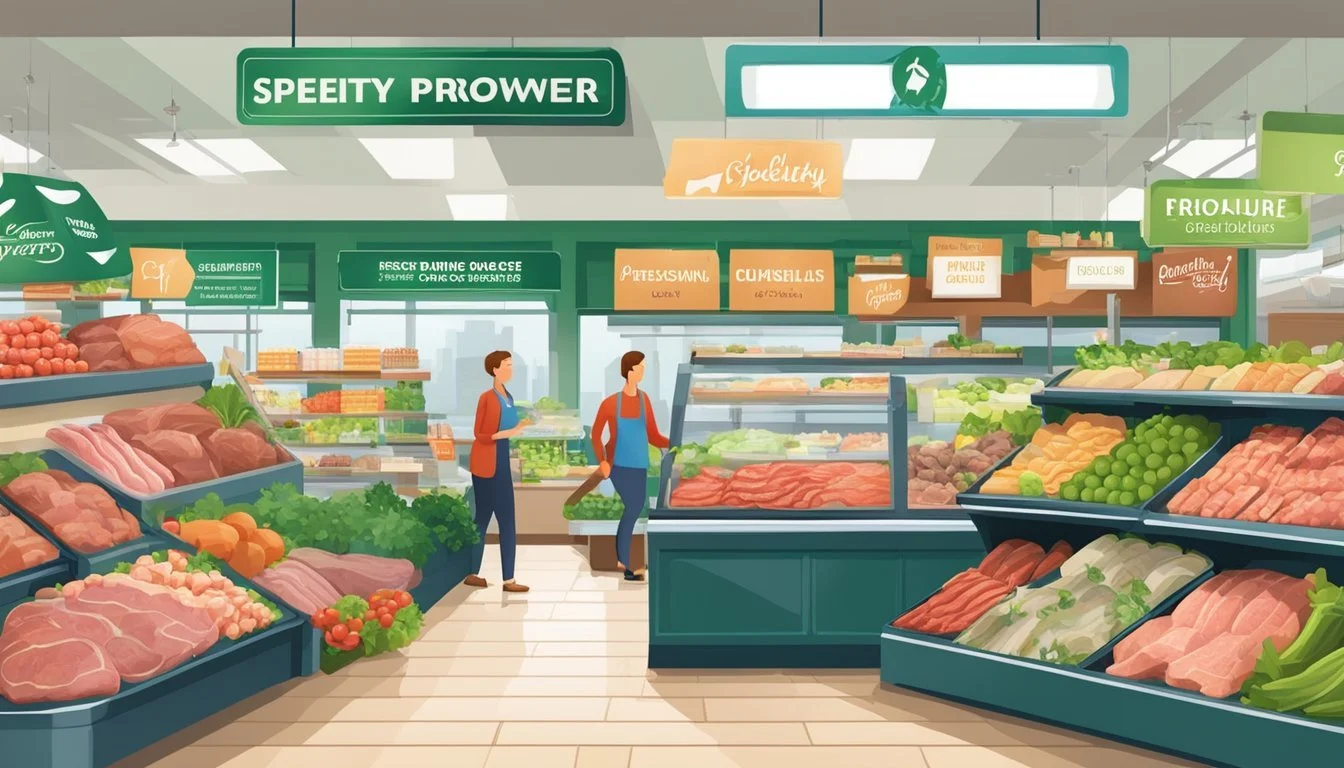From Farm to Table: Unveiling the Best Grocery Stores for Premium Organic Meat
Organic meat has gained popularity among health-conscious consumers seeking high-quality, ethically-raised animal products. As demand grows, many grocery stores have expanded their organic meat offerings to cater to this market segment.
Whole Foods Market consistently ranks as one of the best grocery stores for organic meat, offering a wide selection of certified organic beef, poultry, pork, and lamb. The chain's strict quality standards and commitment to transparency in sourcing have made it a trusted destination for organic shoppers. Other top contenders include Trader Joe's, Aldi, and regional chains like MOM's Organic Market, which emphasize affordable organic options.
When shopping for organic meat, consumers should look for the USDA Organic seal and consider factors such as animal welfare standards, antibiotic use, and environmental impact. Many grocery stores now provide detailed information about their meat suppliers, allowing customers to make informed choices aligned with their values and dietary preferences.
Understanding Organic Meat Certification
Organic meat certification involves strict standards and oversight to ensure products meet specific criteria. The process covers animal welfare, feed, and processing methods.
What Does USDA Certified Organic Mean?
USDA Certified Organic meat comes from animals raised according to federal guidelines. These animals consume 100% organic feed and forage. Farmers cannot use synthetic fertilizers or pesticides on pastures.
Organic livestock receive no antibiotics or growth hormones. Farmers must provide animals with outdoor access and space to exercise their natural behaviors.
The USDA organic seal guarantees that at least 95% of a product's ingredients are organic. For meat, this means the entire animal was raised organically from birth.
The Importance of Animal Welfare Standards
Animal welfare is a key component of organic certification. Organic farmers must provide animals with comfortable living conditions, including proper shelter and space to move freely.
Stress reduction is crucial. Farmers use humane handling methods and limit transport times. Animals have access to the outdoors, fresh air, and sunlight.
Organic standards prohibit physical alterations like tail docking or beak trimming. Animals receive a diet suited to their species, promoting natural growth and health.
These welfare practices aim to improve animal quality of life and produce healthier meat for consumers.
Top Grocery Stores for Organic Meat
Organic meat options have expanded significantly in recent years. Many major grocery chains now offer high-quality organic selections to meet growing consumer demand for healthier, more ethically-sourced proteins.
Comparing Supermarket Options
Whole Foods leads the pack with their extensive organic meat department. Their butchers can provide custom cuts and offer expert advice. Wegmans also excels, featuring a wide array of organic beef, pork, poultry, and lamb. Costco sells organic ground beef and chicken in bulk at competitive prices. Publix and Kroger have improved their organic meat selections, now carrying multiple options in most stores.
Sprouts Farmers Market specializes in natural and organic products, including a robust meat counter. Trader Joe's offers pre-packaged organic chicken, ground beef, and occasional specialty items. Walmart has increased its organic meat offerings, though selection varies by location.
Private Label Organic Brands
Many chains have developed their own organic meat brands. Kroger's Simple Truth Organic line includes beef, chicken, and pork products. Aldi's Simply Nature brand offers affordable organic chicken and ground beef. Safeway's O Organics encompasses various meat options.
Costco's Kirkland Signature organic ground beef and chicken are popular among members. Walmart's Great Value Organic line includes select meat products. These private label brands often provide organic options at lower price points than national brands.
Local vs National Chains: A Closer Look
While national chains offer convenience and consistent pricing, local health food stores often provide unique benefits for organic meat shoppers. These smaller retailers may partner with nearby farms, offering fresher products with lower transportation impact. They frequently provide more information about sourcing and animal welfare practices.
H-E-B, a Texas-based chain, emphasizes partnerships with local ranchers for their organic meat program. Regional chains like these can bridge the gap between national retailers and small local shops, offering a mix of convenience and community connection.
Specialty butcher shops in some areas focus exclusively on organic and pasture-raised meats, providing premium quality and expert knowledge.
Selecting Quality Organic Meats
Choosing high-quality organic meats involves understanding labels and different cuts. Knowing what to look for ensures you get the best value and flavor for your meals.
Understanding Meat Quality Labels
USDA grades indicate meat quality based on marbling and maturity. Prime is the highest grade, followed by Choice and Select. For organic meats, look for the USDA Organic seal. This certifies the animals were raised without antibiotics or growth hormones and fed 100% organic feed.
Grass-fed beef comes from cattle that graze on pasture. It's often leaner than grain-fed beef. "Dry-aged" beef hangs in a controlled environment, concentrating flavor and tenderizing the meat.
Different Cuts of Organic Meat
Prime cuts like filet mignon, ribeye, and NY strip offer excellent marbling and tenderness. These steaks command higher prices but deliver superior flavor and texture.
For more economical options, consider:
Chuck roast: Great for slow cooking
Sirloin: Leaner but still flavorful
Ground beef: Versatile for many recipes
When selecting cuts, look for bright color and even marbling. Avoid meat with dark spots or excessive liquid in the package. Fresh meat should have little to no odor.
The Benefits of Grass-Fed and Free-Range Options
Grass-fed and free-range meats offer superior nutritional profiles and support sustainable farming practices. These options provide consumers with healthier, more ethically-produced meat choices.
Grass-Fed vs Grain-Fed Meat: What's the Difference?
Grass-fed beef comes from cattle that graze on pastures, consuming their natural diet of grasses. This results in meat with lower total fat content and higher levels of beneficial nutrients. Grass-fed beef contains more omega-3 fatty acids, vitamin E, and conjugated linoleic acid (CLA) compared to grain-fed beef.
Grain-fed cattle, on the other hand, are typically raised in feedlots and fed a diet of corn and soy. This leads to faster weight gain but can result in meat with a higher fat content and less favorable nutrient profile.
Grass-fed beef also tends to have a distinct, more complex flavor due to the varied diet of the animals. Many consumers prefer this taste, describing it as "beefier" or more robust than conventional beef.
Exploring Pasture-Raised Meat Benefits
Pasture-raised animals, including cattle, chickens, and pigs, live in more natural environments that allow them to engage in instinctive behaviors. This approach to animal husbandry offers several benefits:
Improved animal welfare
Enhanced meat quality
Environmental sustainability
Pasture-raised animals often require fewer antibiotics due to reduced stress and improved living conditions. This can lead to healthier meat for consumers and helps combat antibiotic resistance.
The meat from pasture-raised animals may contain higher levels of certain nutrients, such as vitamin D in pork and omega-3 fatty acids in chicken eggs. These nutritional advantages stem from the animals' diverse diets and increased exposure to sunlight.
Pasture-based farming systems can also contribute to soil health and carbon sequestration, making them a more environmentally friendly option compared to industrial livestock production.
The Efficacy of Organic Labels
Organic labels play a crucial role in consumer decision-making when purchasing meat products. These labels provide information about production methods and certification standards.
What Is the USDA's Role in Meat Certification?
The United States Department of Agriculture (USDA) oversees the organic certification process for meat products. USDA-certified organic meats must come from animals raised without antibiotics or growth hormones. These animals must also be fed 100% organic feed and have access to the outdoors.
The USDA's National Organic Program sets strict standards for organic meat production. Producers must undergo regular inspections to maintain their certification. This process ensures that products labeled as "certified organic" meet specific criteria.
The Debate on Organic vs Non-Organic Meats
The organic vs. non-organic meat debate centers on health benefits, environmental impact, and animal welfare. Proponents of organic meat argue that it contains fewer pesticides and antibiotic-resistant bacteria.
Critics contend that the nutritional differences between organic and conventional meats are minimal. Some studies suggest that organic meat may have slightly higher levels of omega-3 fatty acids.
Environmental considerations also factor into the debate. Organic farming practices often prioritize sustainability and biodiversity. However, organic meat production can require more land and resources per animal.
Consumer preferences vary, with some prioritizing organic labels like USDA-certified organic, Simple Truth, or Simply Nature. Others focus on terms like "natural," which lacks standardized definitions in meat labeling.
Convenience and Availability
Access to organic meat varies widely between grocery stores and online services. Factors like location, store size, and delivery options impact availability for consumers seeking high-quality organic options.
Grocery Store Availability and Meat Selection
Many large supermarket chains now offer organic meat sections. Whole Foods Market and Sprouts Farmers Market are known for extensive organic selections. Kroger and Safeway typically stock organic chicken, beef, and pork. Smaller natural food stores may have limited but carefully curated organic meat offerings.
Meat departments in these stores often feature:
Fresh organic chicken (whole and parts)
Organic pork options
Some organic turkey products
Selection can vary by location and season. Larger stores in urban areas tend to have more variety. Rural stores may have fewer organic choices.
Online Shopping and Home Delivery Services
Online retailers have expanded access to organic meat. Amazon Fresh delivers organic meat in select markets. Specialty services like ButcherBox and Crowd Cow focus on high-quality organic and grass-fed options.
Benefits of online organic meat shopping:
Wide selection not limited by local availability
Detailed product information and sourcing transparency
Delivery to areas without nearby organic options
Some services offer subscriptions for regular deliveries. Others allow one-time purchases. Shipping perishable items can be costly, but many providers use eco-friendly packaging to maintain freshness.
Supporting Local and Sustainable Meat Sources
Consumers seeking high-quality organic meat have options beyond large supermarket chains. Local butcher shops, farms, and partnerships between grocery stores and regional suppliers offer sustainable and ethically sourced meat products.
The Role of Butcher Shops and Local Farms
Butcher shops play a crucial role in supporting local and sustainable meat sources. These establishments often develop direct relationships with nearby farms, ensuring transparency in sourcing practices. Many butcher shops prioritize organic, grass-fed, and pasture-raised meats.
Local farms, such as Sergi Farms in Wisconsin, provide another avenue for consumers to access sustainable meat. These farms typically raise animals using organic methods and prioritize animal welfare.
Some farms, like Porter Road, have expanded their reach by offering online ordering and nationwide shipping. This allows consumers across the country to support small-scale, sustainable farming practices.
Partnerships Between Grocery Stores and Local Suppliers
Grocery stores are increasingly forming partnerships with local meat suppliers to meet consumer demand for sustainable options. These collaborations benefit both parties and provide customers with access to high-quality, locally sourced meats.
Some grocery chains work with organizations that connect them to small-scale farmers and ranchers. This helps ensure a steady supply of sustainably raised meat products while supporting local agricultural communities.
Partnerships often extend beyond simply stocking products. Many grocery stores showcase the stories of their local suppliers, educating consumers about sustainable farming practices and the benefits of supporting regional producers.
These collaborations can lead to a wider variety of meat options in stores, including heritage breeds and specialty cuts that may not be available through large-scale industrial meat producers.
Cost Considerations and Savings Tips
Finding affordable organic meat requires smart shopping strategies. Comparing prices and taking advantage of promotions can help stretch your grocery budget without compromising on quality.
Comparing Prices Across Different Stores
Prices for organic meat can vary significantly between retailers. Large chains like Costco, Walmart, and Aldi often offer lower prices on organic meats compared to specialty stores. Their private-label organic brands provide even more savings.
Target and Kroger also carry affordable organic meat options. Check weekly ads to spot the best deals. Local farmers' markets sometimes have competitive prices on organic meats, especially when buying in bulk.
Consider less expensive cuts like chicken thighs or beef chuck roast. These options provide great value while still offering the benefits of organic meat.
Maximizing Value with Coupons and Promotions
Many stores offer digital coupons for organic meat products. Download the store's app or join their loyalty program to access these savings. Some brands provide printable coupons on their websites.
Look for "buy one, get one" deals or discounts on soon-to-expire meats. Stock up during these sales and freeze extra portions for later use.
Signing up for store newsletters often grants access to exclusive promotions. Some retailers offer additional discounts for buying in bulk or purchasing whole or half animals directly from local farms.
Timing purchases around holidays can lead to significant savings, as stores frequently discount meats during these periods.
Specialty Organic Meat Providers
Specialty organic meat providers offer unique and high-quality options for discerning consumers. These niche suppliers focus on premium cuts, rare breeds, and sustainable farming practices.
Exploring Niche Markets and Online Retailers
Specialty organic meat providers cater to consumers seeking exceptional quality and unique products. Fossil Farms stands out as a supplier of all-natural meat and farm-raised game. They offer a diverse selection, including American Wagyu beef and exotic meats.
Online retailers like Blackwing Meats have expanded access to organic and exotic meats. Established in 1996, Blackwing provides clean, healthy meats to consumers, retailers, and restaurants across North America.
For those interested in premium beef, Snake River Farms specializes in American Wagyu. Their products are known for exceptional marbling and flavor.
ButcherBox offers a subscription service for organic and grass-fed meats. This model provides convenience and regular access to high-quality cuts.
Primal Pastures focuses on grass-fed beef, emphasizing sustainable farming practices and animal welfare.
These specialty providers often source from small farms, ensuring traceability and supporting local agriculture.








